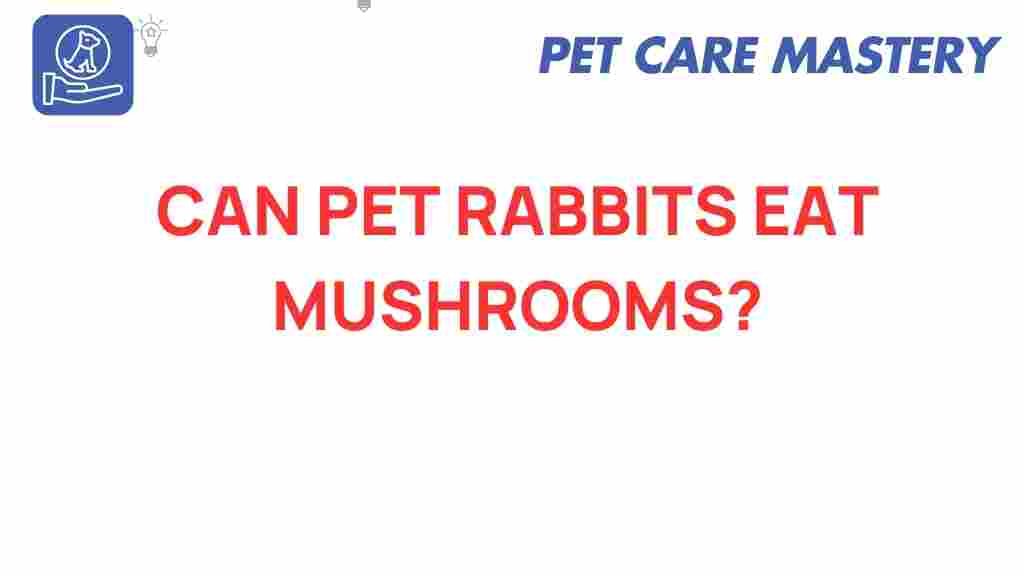The Surprising Truth About Rabbits and Mushrooms: Can They Safely Feast?
If you’re a proud owner of pet rabbits, you may have encountered questions about their diet. One common query is whether rabbits can safely enjoy mushrooms. While it might be tempting to share a slice of your pizza topped with mushrooms, the reality is much more complex. In this article, we will explore the relationship between pet rabbits and mushrooms, providing you with a detailed guide on what you need to know.
Understanding the Rabbit Diet
Before diving into the mushroom debate, it’s crucial to understand what constitutes a healthy diet for pet rabbits. Rabbits are herbivores, meaning they thrive on a diet primarily composed of:
- Hay (the main component of their diet)
- Fresh vegetables (like leafy greens)
- Small amounts of pellets
- Fresh fruit (in moderation)
Each component plays an important role in their health, contributing to their digestive system and overall well-being. Now, let’s take a closer look at mushrooms in this dietary context.
The Basics of Mushrooms
Mushrooms are a type of fungi that come in various shapes, sizes, and colors. While some mushrooms are edible and considered healthy for humans, others can be toxic. This variability raises questions about their safety for pet rabbits.
Can Pet Rabbits Eat Mushrooms?
The short answer is that while some mushrooms are not toxic to rabbits, they are generally not recommended as part of a rabbit’s diet. Here’s why:
- Toxicity Risk: Certain mushrooms can be highly toxic to rabbits. Even the mushrooms that are safe for humans may not be suitable for rabbits.
- Digestive Issues: Rabbits have sensitive digestive systems, and introducing mushrooms could lead to gastrointestinal problems.
- Nutritional Value: Mushrooms do not provide significant nutritional benefits for pet rabbits compared to other vegetables.
Identifying Safe versus Unsafe Mushrooms
If you still want to explore the possibility of feeding mushrooms to your rabbit, it’s essential to know the difference between safe and unsafe varieties. Here are some guidelines:
- Safe Mushrooms: Generally, mushrooms like button mushrooms and shiitake mushrooms are considered safe in small quantities.
- Unsafe Mushrooms: Wild mushrooms can be extremely dangerous. Avoid foraging and feeding any wild mushrooms to your rabbit.
For more information on safe foods for pet rabbits, check out this comprehensive guide.
How to Introduce New Foods
If you decide to try feeding mushrooms to your rabbit, it’s important to introduce any new food gradually. Here’s a step-by-step process to do so safely:
- Choose the Right Mushroom: Opt for a small amount of store-bought button or shiitake mushrooms.
- Wash Thoroughly: Make sure to wash the mushrooms well to remove any pesticides or contaminants.
- Cut into Small Pieces: Chop the mushroom into small, manageable pieces to prevent choking.
- Start with a Tiny Amount: Offer your rabbit a small piece and observe their reaction.
- Monitor for Reactions: Keep an eye on your rabbit for any signs of digestive upset, such as diarrhea or lethargy.
Potential Health Risks
Even if you choose a safe mushroom, there are potential health risks to consider:
- Allergic Reactions: Just like humans, rabbits can have food allergies. Monitor your pet closely.
- Overconsumption: Too much of even safe foods can lead to digestive issues. Always offer new foods in moderation.
- Interaction with Medications: If your rabbit is on medication, consult a veterinarian before introducing any new foods.
What to Do If Your Rabbit Eats a Toxic Mushroom?
If you suspect that your rabbit has ingested a toxic mushroom, it’s crucial to act quickly. Here’s what you should do:
- Identify the Mushroom: If possible, try to identify the mushroom your rabbit consumed.
- Contact a Veterinarian: Immediately call your vet or an emergency animal hospital for advice.
- Provide Details: Share any information about the mushroom, including its appearance and the quantity consumed.
- Follow Instructions: Follow the veterinarian’s guidance carefully, which may involve bringing your rabbit in for treatment.
Alternatives to Mushrooms for Pet Rabbits
If you’re looking for healthy treats for your pet rabbits, consider these alternatives:
- Leafy greens (like romaine lettuce, kale, or parsley)
- Carrots (in moderation due to sugar content)
- Bell peppers (rich in vitamins)
- Herbs (like basil or cilantro)
These options provide essential nutrients without the risks associated with mushrooms.
Conclusion
In conclusion, while some mushrooms are edible and safe for pet rabbits, they are not a necessary or beneficial part of their diet. The risks associated with mushrooms, including toxicity and digestive issues, outweigh any potential benefits. Always prioritize hay, fresh vegetables, and other safe foods for your rabbit’s diet.
By understanding your rabbit’s dietary needs and exercising caution when introducing new foods, you can ensure a happy and healthy life for your pet rabbits. If you have any questions or concerns about your rabbit’s diet, it’s always best to consult with a veterinarian who specializes in exotic pets.
For further reading on rabbit care, visit this reputable source to enhance your knowledge and ensure your furry friend stays healthy and happy.
This article is in the category Nutrition and created by PetCareMastery Team
